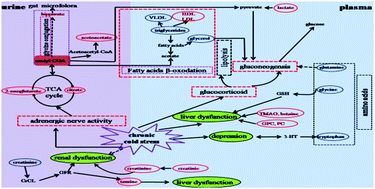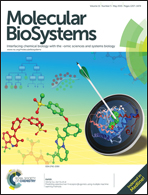System responses to chronic cold stress probed via1H NMR spectroscopy in plasma and urine matrices†
Abstract
Chronic cold stress can trigger biochemical and physiological changes in living organisms, which leads to a rapid loss of homeostasis. However, the biochemical responses of the organism to chronic cold stress are unclear. In this study, we systematically analysed the metabonomic changes under chronic cold stress by using a 1H NMR-based metabonomics approach in conjunction with clinical biochemistry assessments. We found that chronic cold exposure caused significant elevation in the levels of lipoproteins (HDL, LDL), lactate, acetoacetate, creatine, creatinine, choline metabolites (GPC, PC and betaine), TMAO and taurine but reduction in the levels of VLDL, glutamine, glycine and glycerol in plasma. Increased levels in urinary TCA cycle intermediates (2-ocoglutarate and citrate), acetoacetate, taurine, TMAO, betaine and hippurate were also found in model rats, together with the reduction of creatinine and tryptophan levels. The results indicated that chronic cold stress caused widespread metabolic changes involved in lipid and energy metabolism, gluconeogenesis, the TCA cycle, and gut microbiota disorders, accompanied with hepatic and renal dysfunction. These findings provide a comprehensive insight into the biochemical consequences and metabolic responses to chronic cold stress in rats.


 Please wait while we load your content...
Please wait while we load your content...